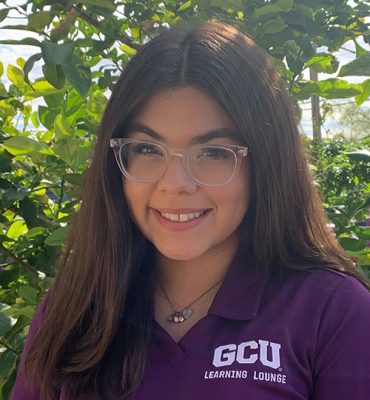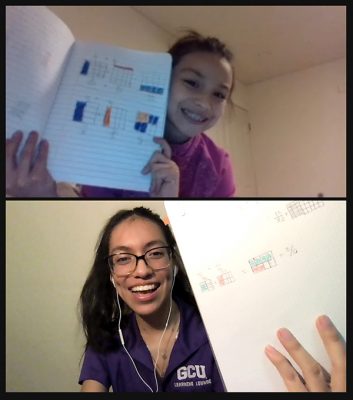
By Rick Vacek
GCU News Bureau
Virtual learning has been tough on students during the pandemic, but Grand Canyon University’s highly acclaimed Learning Lounge turned it into a virtual victory.

When the nationwide shutdown made it impossible to invite students in grades 2-12 onto campus for free tutoring sessions, the Learning Lounge quickly pivoted to an online platform that resulted in 2,824 academic sessions totaling 2,135 hours, with 305 unique students from late August to April. And talk about customer satisfaction: Approximately two-thirds of the students seeking assistance were repeat participants.
As always, the GCU students who serve as learning advocates (LEADs) were at the forefront.
“We couldn’t have done it without them,” said Shari Stagner, Director of K12 Outreach. “What we have in our favor is that they’re technology natives, so it wasn’t a huge shift for them. They worked quickly through any inhibitions they may have had with being on camera.”
For example, they had to figure out how to use a whiteboard in a Zoom meeting or be able to see a student’s work. Keeping younger students’ attention was a challenge, too.
“At first, it was a bit difficult in terms of not being sure what was going to happen,” said Jacqueline Gallegos, a LEAD who recently completed her sophomore year as a double major in Christian studies and psychology. “But after a month or so, it was a very smooth transition. We started getting a lot of students joining in. It was almost as if we had never left the Lounge. Of course, there was that change to virtual, but the energy was still the same.”
Jackie Marino, a LEAD who is set to graduate in December with her Business Administration degree, saw that as a product of the daily stress that distance learning caused.

“Oftentimes they’re tired and really don’t want to be there because they already did all these hours on Zoom with their teacher, and now they have to go to this tutoring,” she said. “I just like to get a conversation going. I don’t like immediately starting like, ‘OK, let’s do some work.’ Building that bond at first is crucial in the session.”
Marino told the story of a high school student who was not receptive to the weekly online visits starting out:
“There were times she’d finish her homework early, and we’d talk about high school life and what college is like. We went to twice a week and then three times a week, and she keeps coming back. Not only are you building that relationship, but you can see how much they’ve grown. We get along so well.”
Those relationships have become standard in the Learning Lounge’s eight years, and not even a global pandemic could lessen their impact. But it does as much for the LEADs as it does for their younger proteges.
Jose Monarrez, who graduated in April with his Bachelor of Science degree in Mechanical Engineering and now is a systems engineer for the Nikola Motor Company, already misses the relationships he built as a LEAD.
“It wasn’t until I was about to leave where it hit me,” he said. “I was like, ‘Dang, I’m really going to miss these kids.’ Just being with them and helping them out, seeing them grow was one of the perks of the job.
“Even though it might not feel like it, you’re going through a process with them when they’re learning. It’s not always just academic stuff. You’re a role model to them. They pick up on stuff that you tell them you do, your good habits.”
Being a role model led to questions such as, “How do you study?” And that, in turn, made him take another look at how indeed he did study.
“You’re talking to them and sometimes you’re realizing, ‘Wow, I could do this so much better. I shouldn’t tell them this because I have to do better, too.’ It’s like a moment of reflection,” he said.
There were a lot of moments of reflection – and reaction – when the Lounge had to shift to virtual. Fortunately, it already had been introduced in 2019 to students in California.

“Thank goodness we had that in our back pocket,” Stagner said. “We knew it could work. We knew Zoom was a viable platform. Part of it is not making things over-complicated. Keep it simple. Don’t simplify the programming, what we offer students. That would not change unless it’s to enhance what we do. Keep it simple and don’t over-complicate our approach.”
Previously, students who came to campus didn’t have to book an appointment, but that changed with the online process. But Stagner kept that simple, too.
All students or their parents have to do is go to the Learning Lounge website and click on “Book a LEAD.” Each LEAD has a bio with what their major is and what subject areas they do. There’s a picture of them (there are 32 LEADs) plus an asterisk if they’re bilingual. They even have business cards.
A click on “Book an appointment” shows their schedule. Most LEADs handle five to six appointments a day.
The other challenge Stagner had to hurdle was getting the word out with many schools in distance-learning mode. “We’ve really had to revamp our marketing strategy,” she said.
That meant turning to Instagram and Facebook and targeting specific zip codes and student and parent groups. It also led to a new liaison with Big Brothers Big Sisters.
And then there was the need to keep track of the LEADs’ work. They fill out a summary shift for each meeting and send the information to the front desk, which puts it in a database.

One of the trademarks of the in-person experience at the Lounge was other LEADs jumping in to help if a youngster needed extra assistance. That still happens often, and now supervisors can pop in, too, to make sure a session is going well.
“It’s not a gotcha – we’re just doing our job,” Stagner said.
The LEADs’ familiarity with technology was invaluable to the online transition. Monarrez, for example, quickly adapted to Zoom whiteboards and screen sharing. “I feel like communication wasn’t hindered that much because of all the features,” he said.
But the main thing was just their attitude about serving students and meeting them where they’re at. That will continue to be key assuming the in-person Learning Lounge returns this fall, both on campus and in the Milwaukee Brewers’ facility in Maryvale. That’s the plan, although the virtual meetings will continue to be available.
And those lessons the LEADs learned during the pandemic will continue to be applied.
“At first it was a bit tough because a lot of the students that we got were new, so you had never interacted with them,” Gallegos said. “It’s learning how to become a friend for them but also someone they can respect. We’re not a teacher, but we’re the tutor.
“I develop communication from the very first meeting. I want to try to get to know them and make them feel comfortable enough that they don’t feel like they’re at school. I know a lot of these students struggle with online school. Since it’s one-to-one, it’s a bit easier getting to know that student.”
They’re focused on getting to know more of them than ever. It’s yet another study in adapting and then thriving during the pandemic, no matter how big the challenge. Where there’s a need, there’s a LEAD.
Contact Rick Vacek at (602) 639-8203 or [email protected].
****
Related content:
GCU Today: Learning Lounge launches virtual academic support



































































